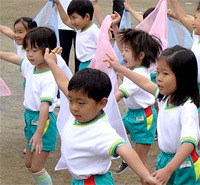What children teach us about freedom and naturalness
 Seven months ago, my first child was born here in Japan. A beautiful girl (pictured right). Anyone who has kids knows that they change your life like no other event can, and though you are in the role of parent and teacher, it is your child who actually teaches you far more than you ever expected. Children remind you that genuineness, naturalness, and the immediacy of the moment are what life is suppose to be all about. What is missing for many of us in our professional and personal lives is freedom, naturalness, and spontaneity, the three things that young children have in abundance. Whether we use multimedia or not, what is missing too often from presentations in the modern era is that human-to-human connection that exists where naturalness is allowed to breathe.
Seven months ago, my first child was born here in Japan. A beautiful girl (pictured right). Anyone who has kids knows that they change your life like no other event can, and though you are in the role of parent and teacher, it is your child who actually teaches you far more than you ever expected. Children remind you that genuineness, naturalness, and the immediacy of the moment are what life is suppose to be all about. What is missing for many of us in our professional and personal lives is freedom, naturalness, and spontaneity, the three things that young children have in abundance. Whether we use multimedia or not, what is missing too often from presentations in the modern era is that human-to-human connection that exists where naturalness is allowed to breathe.
Natural like children
In Zen and Japanese Culture, Daisetz Suzuki says that in each of us there is a desire at some level to "return to a simpler form of living which includes simpler ways of expressing feelings and acquiring knowledge." In other words, there lives in each of us a desire to return to our inner nature or a natural way of life. This does not mean that we want to return to a primitive life of a prehistoric people, Suzuki insists. Going back to nature (or Nature) means a return to a life of freedom and emancipation. "When we speak of being natural, we mean first of all being free and spontaneous in the expression of our feelings, being immediate and not premeditating in our response to environment...." If we reflect on our own lives we realize we were the most free and most natural when we were children. Suzuki says in fact that "naturalness means to be like a child" — not in the sense of being "a bundle of egotistic impulses" — but rather like a child in the sense of being free, in the moment, with an open mind, and behaving with a true genuineness of motives.

"When there is no crookedness in one's heart, we say that one is natural and childlike." — Daisetz T. Suzuki
You had it once. You can have it again.
 Pablo Picasso once said, "All children are born artists. The problem is to remain artists as we grow up." Here in my home of Japan, we are not known for producing many remarkable orators or engaging presenters in the business world. Audiences endure more than they are engaged and inspired. Yet, when I visited elementary schools here in Japan, I found the young students there were always amazingly engaged, energetic, and happy to participate and share their ideas and stories. I suspect elementary schools in your town are filled with similarly energetic, hopeful students as well, no matter where you are in the world.
Pablo Picasso once said, "All children are born artists. The problem is to remain artists as we grow up." Here in my home of Japan, we are not known for producing many remarkable orators or engaging presenters in the business world. Audiences endure more than they are engaged and inspired. Yet, when I visited elementary schools here in Japan, I found the young students there were always amazingly engaged, energetic, and happy to participate and share their ideas and stories. I suspect elementary schools in your town are filled with similarly energetic, hopeful students as well, no matter where you are in the world.
As very young children, we were naturally authentic communicators and conversationalists. But then somewhere down the line we began to be guided away from that natural, human talent as a shift occurred in our education that emphasized "the correct answer" and demanded careful, formal speech—speech that did not encourage engagement and dissuaded our true personalities from coming out, lest we run the risk of ridicule. But you are an adult now and you can change your destiny. You can find again that naturalness, creativity, and energy you had as a child and combine it with your knowledge, skills, and passion to make real human-to-human connections that lead to remarkable change. (photo source)
Tomorrow: " Communication and life tips that children teach us"



Garr Reynolds's Blog
- Garr Reynolds's profile
- 107 followers



